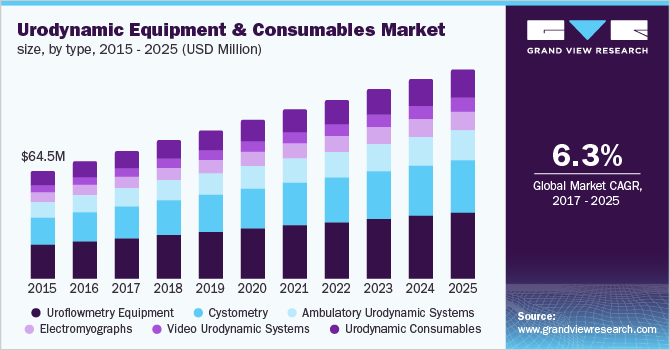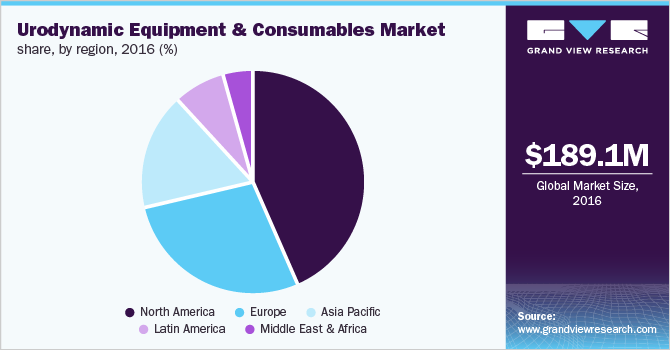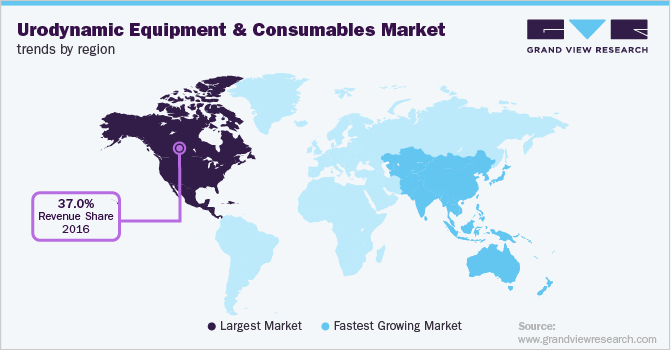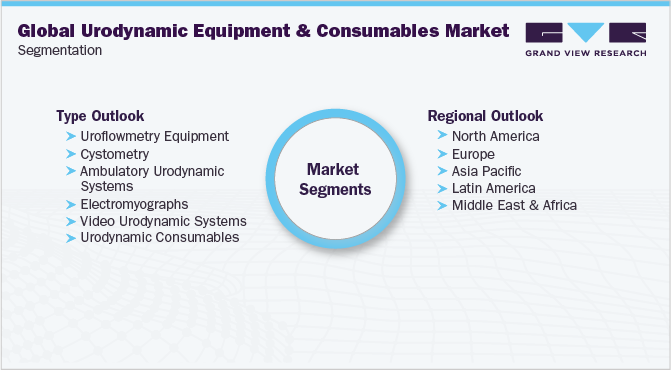
Urodynamic Equipment And Consumables Market Size, Share & Trends Analysis Report By Type (Uroflowmetry Equipment, Cystometer, Ambulatory Systems, Electromyographs, Video Urodynamic Systems), And Segment Forecasts, 2018 - 2025
- Report ID: GVR-1-68038-493-2
- Number of Pages: 98
- Format: Electronic (PDF)
- Historical Range: 2014 - 2016
- Industry:Healthcare
Report Overview
The global urodynamic equipment and consumables market size to be valued at USD 335.40 million by 2025 and is expected to grow at a compound annual growth rate (CAGR) of 6.32% during the forecast period. The market is predominantly driven by rising prevalence of diseases such as benign prostatic hypertrophy, bladder cancer, neurogenic bladder dysfunction, overactive bladder, and others. According to the World Health Organization, globally, 330,000 new cases of bladder cancer are diagnosed every year. In addition, as per National Association for Incontinence, 200 million people globally are suffering from urinary incontinence, which raises the clinical urgency to adopt urodynamic equipment.

Increase in healthcare initiatives being undertaken to create awareness about urological problems and available diagnostics &treatment is anticipated to broaden growth potential. For instance, “Let’s Talk and Think About Continence” (Japan), “Continence Awareness Week” (Continence Foundation, UK), and others.
As a result of these initiatives, an increasing number of people suffering from urinary incontinence have been able to overcome the social stigma associated with it and have begun consulting physicians. This has thereby fueled demand for these medical devices.
Technological advancements, such as doppler ultrasound video urodynamic, condom catheter, intravesical prostatic protrusion, and penile cuff, are also amongst major growth contributors. In addition, continuous product approvals, a proliferating network of testing centers, and availability of medical reimbursement for urological preliminary tests are also responsible for propelling the market.
Urodynamic Equipment And Consumables Market Trends
The market is expected to be driven by the increasing elderly population, as well as the rising prevalence of diabetes, renal, and neurological illnesses. Since senior people are much more vulnerable to certain ailments, they may need to be admitted to the hospital for observation and diagnosis by a doctor. Furthermore, Urine leaks in women at the time of childbirth, menopause, and pregnancy are expected to encourage product uptake and fuel market growth.
Hospitals are anticipated to develop as a prominent end-user with significant growth due to the increasing number of patients agonized from urological illness around the world. Furthermore, hospitals are outfitted with cutting-edge instruments and equipment, making them the recommended treatment option. In the coming years, more government financing in the medical industry will help the segment's expansion.
UroMonitor is now undergoing basic clinical trials to see if it has any effects that are similar to or comparable to traditional urodynamic testing. Foregoing testing is projected to create growth opportunities for the market during the forecast period. Moreover, the existence of key players will fuel local market dynamics with technical developments. The increased government support for infrastructure investment, as well as advantageous reimbursement rules for urological treatments, will help to propel the market forward.
Type Insights
2016年,泰尿疗段为主pe segment with a share of over 30.0%. The substantial share registered by this segment is a result of extensive usage of uroflowmetry in the diagnosis of urinary blockage, benign prostatic hypertrophy, bladder cancer, neurogenic bladder, bladder dysfunction, and prostate cancer.
Due to innovative technology, uroflowmetry products give accurate results. As a result, there is a significant increase in adoption rates amongst physicians. In addition, increasing global presence of manufacturers owing to expanding distribution networks results in greater access to these products, which is also a key contributing factor.
Ambulatory systems are expected to exhibit a strong CAGR of over 7.0% throughout the forecast period. The exponential growth of this segment can be attributed to the associated benefits of ambulatory systems. These benefits include greater portability, affordability, and real-time diagnosis to yield highly accurate results.
Electromyographs (EMGs) are anticipated to grow moderately during the forecast period. These devices find application in a wide range of disorders, such as muscular dystrophy, myasthenia gravis, radiculopathies, carpal tunnel syndrome, amyotrophic lateral sclerosis, sciatica, and many others. EMG has various diagnostic and research applications. EMG is also used to avoid postoperative residual curarization (PORC) and conduct nerve conduction studies.
Regional Insights
In 2016, North America accounted for the largest share of over 37.0% amongst all regions. This can be attributed to rising prevalence of target diseases. The dominant share is also a consequence of high adoption rate of urodynamic products in various diagnostic, healthcare, & pharmaceutical centers and growing preference of urogynecologists & urologists for urodynamic tests.

Asia Pacific is expected to witness an exponential CAGR of over 6.0% throughout the forecast period. This growth can be attributed to a rise in the prevalence of urological diseases, growing disposable income, and unmet patient needs. Rapid rise in geriatric population, which has greater vulnerability to urological dysfunctions, is expected to further contribute to the market growth across this region.
Another factor expected to contribute to growth in Asia Pacific is increasing availability and usage in diagnostic centers. In addition, rapid economic growth in developing countries such as India, Singapore, and China others are also anticipated to boost product penetration.

Key Companies & Market Share Insights
The highly competitive environment is a result of key players extensively deploying sustainability strategies. These include Boston Scientific Corporation; LABORIE; Verathon, Inc.; and others. These companies are consistently striving to implement strategies such as mergers & acquisitions, new product development initiatives, and geographical expansion.
For instance, in March 2017, LABORIE acquired ANDROMEDA Medizinische Systems GmbH to expand its product offerings in Europe. Similarly, in November 2016, Boston Scientific Corporation launched Dakota Nitinol Stone Retrieval Device with OpenSure Handle to expand its product portfolio.
Recent Developments
In October 2021, Laborie Medical Technologies Corp acquired Pelvalon, Inc.,The acquisition will help Laborie's extended growth by using Patricia Industries' biology and medical sciences experience, as well as aligning with the company's mission of generating value for individuals and society via the creation of positive and sustainable enterprises
In June 2022, Boston Scientific Corporation signed a definitive deal with Synergy Innovation Co., Ltd to acquire its majority investment in M.I.Tech Co., Ltd, the developer of the HANAROSTENT technology. The investment cost is KRW 14,500 per share, for a total of KRW 291.2 billion (about $230 million at current exchange rates), according to closing amendments
In June 2021, Verathon announced the launching of their next-generation bladder volume monitoring technology, BladderScan i10. The solution gives customers additional capabilities in terms of usability and reliability
Urodynamic Equipment And Consumables Market Report Scope
Report Attribute |
Details |
Revenue forecast in 2025 |
USD 335.40 million |
Growth rate |
CAGR of 6.32% from 2017 to 2025 |
Base year for estimation |
2016 |
Historical data |
2014 - 2016 |
Forecast period |
2017 - 2025 |
Quantitative units |
Revenue in USD million/billion and CAGR from 2017 to 2025 |
Report coverage |
Revenue forecast, company ranking, competitive landscape, growth factors, and trends |
Segments covered |
Type, region |
Regional scope |
North America; Europe; Asia Pacific; Latin America; Middle East & Africa |
Country scope |
U.S.; Canada; Germany; UK; Japan; China; India; Brazil; Mexico; South Africa |
Key companies profiled |
Boston Scientific Corporation; LABORIE; Verathon, Inc. |
Customization scope |
Free report customization (equivalent to up to 8 analysts working days) with purchase. Addition or alteration to country, regional & segment scope. |
革命制度党cing and purchase options |
Avail customized purchase options to meet your exact research needs.Explore purchase options |
Global Urodynamic Equipment And Consumables Market Segmentation
This report forecasts revenue growth at global, regional, & country levels and provides an analysis on the industry trends in each of the sub-segments from 2014 to 2025. For the purpose of this study, Grand View Research has segmented the global urodynamic equipment and consumables market on the basis of type and region:

Type Outlook (Revenue, USD Million, 2014 - 2025)
Uroflowmetry Equipment
Cystometry
Ambulatory Urodynamic Systems
Electromyographs
Video Urodynamic Systems
Urodynamic Consumables
Urodynamic Catheters
Urodynamic Pumps and Transducer Sets
Regional Outlook (Revenue, USD Million, 2014 - 2025)
North America
The U.S.
Canada
Europe
Germany
The U.K.
Asia Pacific
Japan
China
India
Latin America
Brazil
Mexico
Middle East & Africa
South Africa





